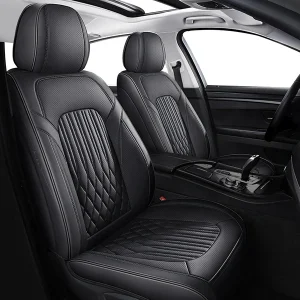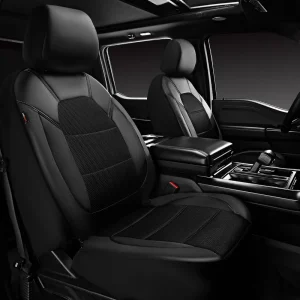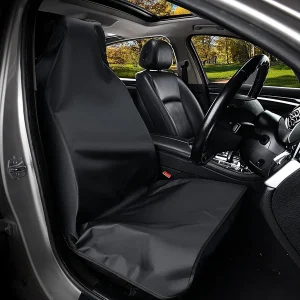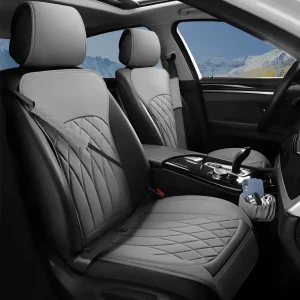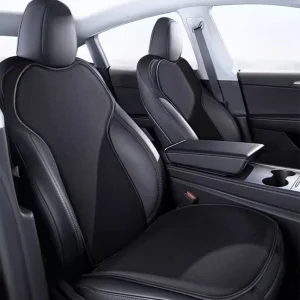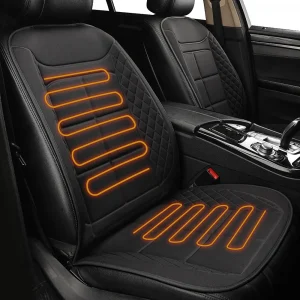Auton istuinsuojat tekevät muutakin kuin vain suojaavat alkuperäisiä istuimiasi – ne parantavat mukavuutta, antavat persoonallisuutta ja jopa auttavat säilyttämään ajoneuvon arvon. Mutta kun on kyse nahka- ja kangasistuinpäällisten välillä valitseminenKuljettajat usein miettivät: kumpi on parempi vaihtoehto?
Käydään läpi kunkin materiaalin hyvät ja huonot puolet, jotta voit päättää, mikä sopii parhaiten tarpeisiisi.

1. Miksi auton istuinsuojat ovat tärkeitä
Ajatpa sitten upouudella katumaasturilla tai ikääntyvällä sedanilla, auton istuinsuojat voi tehdä valtavan eron. Ne suojaavat alkuperäistä verhoiluasi kulumiselta, roiskeilta ja UV-vaurioilta. Sen lisäksi ne myös parantavat ajoneuvosi yleistä mukavuutta ja tyyliä. Mutta suurin kysymys kuuluu:
Nahkaiset vs. kangaspäälliset – kumpi on parempi vaihtoehto?
2. Nahkaisten istuinsuojien edut
A. Ensiluokkainen ulkoasu ja tuntuma
Nahka (tai korkealaatuinen keinonahka) lisää välittömästi ylellisen ja tyylikkään tunnelman autosi sisätiloihin. Se on usein ensisijainen valinta luksusajoneuvoille tai ammattilaisille, jotka haluavat hienostuneemman ympäristön.
B. Kestävä ja helppo puhdistaa
Yksi nahan suurimmista vahvuuksista on sen kestävyys. Se kestää roiskeita, likaa ja yleistä kulumista. Nopea pyyhkäisy kostealla liinalla riittää yleensä puhdistamaan sen.
C. Jälleenmyyntiarvon korotus
Nahkasisustuksen omaavien autojen jälleenmyyntihinta on usein korkeampi. Nahkaiset istuinsuojat voi auttaa säilyttämään tai jopa parantamaan ajoneuvosi arvoa.
D. Mukava kylmällä säällä
Vaikka nahka voi olla aluksi kylmä talvella, monilla moderneilla nahkapäällisillä on lämpötilaa sääteleviä ominaisuuksia, jotka pitävät olosi mukavana.

3. Nahkaisten istuinsuojien haittapuolet
A. Korkeammat kustannukset
Oikea nahka on huomattavasti kalliimpaa kuin kangas. Jopa synteettinen nahka (PU tai PVC) on kalliimpaa kuin useimmat kangasvaihtoehdot.
B. Kuuma kesällä
Nahka ei ole kovin hengittävää. Kuumalla säällä istuimet voivat muuttua epämukavan lämpimiksi ja tahmeiksi, varsinkin pitkillä matkoilla – ellei autossasi ole tuuletettuja istuimia.
C. Vaadittava huolto
Nahka vaatii ajoittain käsittelyä erikoistuneilla hoitoaineilla halkeilun, haalistumisen ja kuivumisen estämiseksi.
4. Kankaisten istuinsuojien edut
A. Edullinen
Kangaspäälliset ovat paljon edullisempia, mikä tekee niistä vankan valinnan kustannustietoisille auton omistajille tai niille, jotka vaihtavat autoa usein.
B. Hengittävä ja mukava
Erityisesti lämpimässä ilmastossa hengittävät kangaspäälliset auttavat pitämään istuimet viileinä ja kuivina. Tämä on suuri plussa niille, jotka ovat alttiita hikoilulle pitkien työmatkojen aikana.
C. Mukautettavat mallit
Kirkkaista kuvioista neutraaleihin sävyihin, kangaspäälliset tarjoavat enemmän personointia. Voit löytää vaihtoehtoja, jotka sopivat makuusi, olipa kyseessä sitten urheilullinen, elegantti tai rento tyyli.
D. Parempi ote
Jotkut kangasmateriaalit tarjoavat enemmän kitkaa, mikä tarkoittaa vähemmän liukumista käännöksissä tai jarrutuksessa.
5. Kangaspäällisten haitat
A. Vaikeampi puhdistaa
Roiskeet voivat imeytyä kankaaseen ja aiheuttaa tahroja ja hajuja. Puhdistaminen vaatii usein suojusten poistamista tai erikoispuhdistusvälineiden käyttöä.
B. Vähemmän kestävä
Kangas kuluu nopeammin kuin nahka. Se voi haalistua, nukkaantua tai repeytyä pitkäaikaisessa käytössä.
C. Vähemmän premium-ulkonäkö
Vaikka jotkut kangaspäälliset näyttävät upeilta, niistä yleensä puuttuu nahan visuaalinen tehokeino, varsinkin luksus- tai yritysajoneuvoissa.
6. Vertailu
| Tekijä | Nahkaiset istuinsuojat | Kangaspenkin suojukset |
|---|---|---|
| Hinta | Korkeampi | Alentaa |
| Kestävyys | Erinomainen | Kohtalainen |
| Puhdistus ja huolto | Helppo (pyyhki puhtaaksi) | Vaatii pesun tai työkalut |
| Mukavuus | Lämmin talvella, kuuma kesällä | Hengittävä ympäri vuoden |
| Tyyli ja ylellisyys | Huippuluokan, ammattimainen | Rento, henkilökohtainen |
| Jälleenmyyntiarvo | Parantaa auton arvoa | Minimaalinen vaikutus |
7. Kenen tulisi valita mitä?
Valitse nahkaiset istuinsuojat Jos sinä:
- Haluatko ylellisen tai bisnesilmeen
- Suunnittele auton pitämistä pitkään
- Arvosta pitkäaikaista kestävyyttä ja jälleenmyyntiarvoa
- Älä välitä satunnaisesta nahanhoidosta
Valitse kankaiset istuinsuojat, jos:
- Ovat tiukemmalla budjetilla
- Elää kuumassa tai kosteassa ilmastossa.
- Mieluummin mukava ja hengittävä istuin.
- Kuten hauskoja kuvioita tai räätälöityjä ulkonäköjä
8. Loppusanat ja ostovinkit
Molemmat nahkaa ja kangasta Istuinsuojilla on paikkansa. Nahka tuo ylellisyyttä, on helppohoitoista ja tarjoaa pitkäaikaista vastinetta rahalle – ihanteellinen niille, jotka haluavat tyylikkään ja tyylikkään sisustuksen. Kangas tarjoaa mukavuutta, kohtuuhintaisuutta ja suunnittelun joustavuutta – täydellinen satunnaiskuljettajille tai lyhytaikaiseen käyttöön.

Ostovinkkejä:
- Nahkatuotteiden kohdalla valitse pintanahkaa tai aitoa nahkaa Jos budjettisi sallii, vältä heikkolaatuista PU-muovia.
- Kankaan osalta etsi vedenkestävät ja UV-suojatut vaihtoehdot pidentääkseen elämää.
- Jos etsit hengittävää kangasratkaisua, tutustu parhaiten arvioidut hengittävän kankaan istuinpäälliset verkosta löytääksesi vaihtoehtoja, jotka tarjoavat parhaan mukavuuden kuumaan ilmastoon.
Niin, Kumpi on parempi, nahka- vai kangaspäälliset? Se riippuu viime kädessä elämäntyylistäsi, ilmastostasi, budjetistasi ja ajoneuvotyypistäsi.

